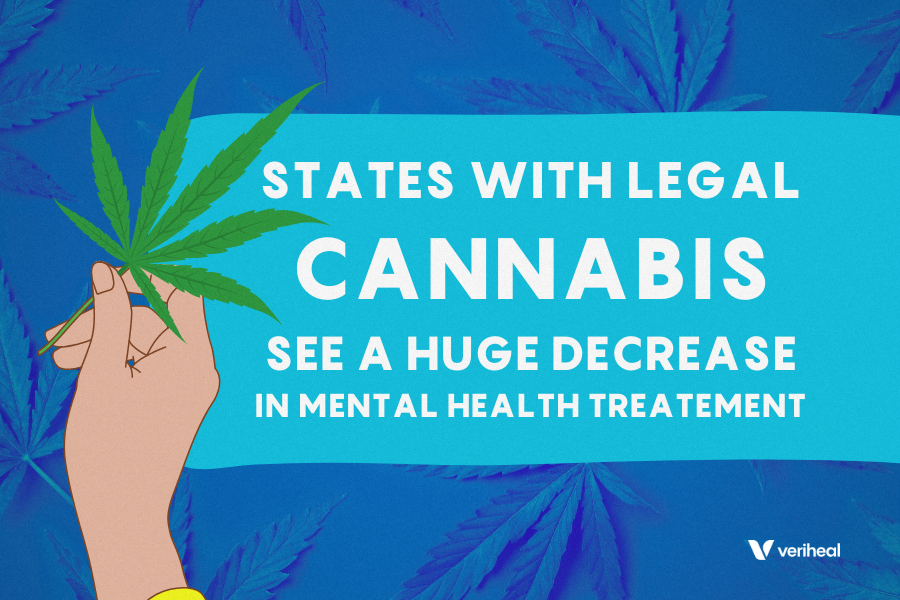States legalizing recreational cannabis are seeing an unexpected and significant decrease in mental health treatment admissions. This fascinating correlation between cannabis legalization and mental health, emerging against the backdrop of changing cannabis policies nationwide, sparks curiosity and prompts an immediate investigation into its underlying mechanisms. Unveiling these connections could reshape knowledge and understanding of public health implications and policy outcomes in this rapidly evolving field.
Here’s what the latest study fresh out of the journal Health Economics has to say.
About the Study: Cannabis Legalization and Mental Health
To delve deeper into this unexpected correlation, we turn our attention to a recent study spearheaded by Alberto Ortega, a prominent professor at Indiana University’s O’Neill School of Public Health. Ortega’s research meticulously analyzed data from ten states where adult-use cannabis has become legal. The study utilized a methodological framework known as ‘event-study within a difference-in-differences,’ and evaluated the immediate and short-term impact of state recreational marijuana laws (RMLs) on admissions to mental health treatment facilities. This comprehensive study offers vital insights into the effects of these policies and provides valuable context for further exploration.
Findings of the Study
The findings from Ortega’s study are nothing short of illuminating. The data revealed that shortly after the adoption of recreational marijuana laws, states began to see fewer admissions to treatment centers for mental illness. This downward trend did not apply to a specific demographic. It is mainly driven by a broad spectrum of individuals, including White and Black patients, particularly those funded by Medicaid.
Remarkably, these results held firm across female and male admissions, supporting the validity of the study’s findings. This evident impact of recreational marijuana laws on mental health treatment admissions calls for further research and understanding.
Impact of Cannabis Legalization on Mental Health Over Time
Perhaps one of the most intriguing aspects of Ortega’s study is the timeliness of the recreational marijuana laws. The research underscores a clear, immediate, and statistically significant decrease in total mental health treatment admissions following a state’s adoption of such laws. However, the magnitude of this effect changes over time. It intensifies as time progresses. By the fourth year post-adoption, the decrease becomes even more pronounced.
Why You Should Get Your Medical Marijuana Card
Veriheal has satisfied millions of patients nationwide by giving them access to these benefits
- Larger purchase limits
- Peace of mind
- Enhanced legal protection
- Access to higher potency strains
- Save up to 25% on cannabis purchases
- Skip the line at the dispensary
In measurable data, Ortega estimates that during the first few years after passage, these laws led to a remarkable drop of 37% in mental health treatment admissions. This equates to roughly 92 fewer admissions per 10,000 residents in a state. This persistent and growing impact over time is an essential aspect of the broader picture that this research presents.
Puzzles and Possibilities
Despite the compelling findings, the study presents a fascinating mystery: what’s the mechanism driving this decrease in the number of people seeking mental health treatment? Ortega acknowledges that pinpointing the precise reason is challenging due to data limitations. However, he suggests two potential explanations.
One possibility is that legalizing recreational marijuana may lead to increased usage, which could undoubtedly boost mental health. Another theory suggests that individuals who require mental health treatment might find it easier (and safer) to substitute or self-medicate with marijuana post-legalization. These speculations, while intriguing, emphasize the need for further research to uncover the complexities surrounding the relationship between cannabis legalization and admissions for mental health care.
Broader Context and Impact of Cannabis Legalization on Mental Health
Ortega’s research significantly contributes to a field that continues to evolve rapidly. As more states consider or enact legislation to legalize marijuana, ongoing research efforts are crucial to understanding the full impact of these policies. In fact, a policy paper published in 2022 found no increase in youth marijuana consumption in states where prohibition had ended, suggesting variations in the demographic impacts of legalization.
Changes in consumer behavior are also notable, with recent surveys revealing that more than 50% of marijuana users in legal states purchase their marijuana supply from brick-and-mortar dispensaries. This broader context — the continuing trend of legalization, shifts in consumption and purchasing patterns, and the need to further explore the impact on mental health — forms an essential part of the discourse on the role of cannabis as medicine in American society.
Final Thoughts
The trend of legalizing recreational marijuana and its unexpected correlation with a decrease in hospitalizations for mental illness provides a fresh and compelling perspective on the ramifications of such policies. Alberto Ortega’s pioneering research, spotlighting this significant decrease across various demographics and increasing intensity over time, offers crucial insights that could potentially influence future policy decisions. However, questions remain. The mechanisms driving these decreases are yet to be definitively established and warrant further study to draw any definitive conclusions.
In addition, it is important to consider the broader context, including shifting consumption and purchasing habits, to fully comprehend the impact of these changes on society. As we move forward, it’s clear that the evolving landscape of cannabis legalization will continue to shape and challenge our understanding of public health, policy, and societal norms.
Author, Share & Comments
















